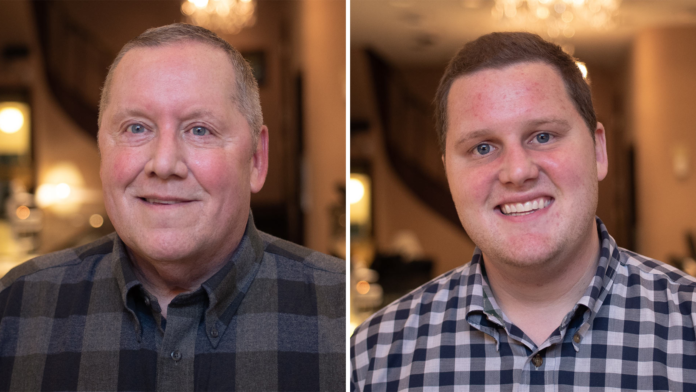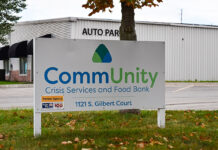
Bill and Charlie Nusser are the father and son duo behind Hands Jewelers, a venerable family-operated store in Iowa City providing jewelry, gems, and watches for more than 165 years.
Bill and Charlie both share their respective stories about how they first joined the family business, how they navigate the line between business and family, and the unique ways their business has evolved over time. Additionally, Bill reflects on some of the worst adversity the business has faced, Charlie shares how his approach to the financials has shifted, and they both explore what real success means to them.
I learned a lot, and I think you will too.
Sponsored by MidWestOne Bank, this is the latest edition of the CBJ’s new podcast feature with Nate Kaeding and notable Iowa business and cultural leaders, available first to CBJ members. Listen to this episode below, and subscribe on Spotify, iTunes, Google Play, Stitcher.
Nate Kaeding: This year on the podcast, we’re exploring family businesses and generational entrepreneurship. Charlie, you’re the ninth generation of Hands Jewelers, correct?
Charlie: For jewelers in the family, that’d be correct. For business owners, I’ll be the fifth generation here in Iowa City. It’s an honor. It’s really neat.
Bill, take us back to some of your earlier childhood memories growing up in and around Hands Jewelers and what you remember about the business as a kid growing up.
Bill: When I was little, my grandfather was running the business. I guess maybe my father was, but my grandfather was still working there. He was kind of a wise old guy — a man of few words — but when he spoke, you listened. He was a bench jeweler by trade, and back then there were a lot of services that were associated with our business in-house, like watchmaking. We had a couple of jewelers and a couple of watchmakers which, for a small store in a small town, was a lot. We were always going in and out of the place, and it didn’t seem extraordinary that it was an old business. We knew the inside of the store was “old-looking” back then, but it was fun. It was just part of our life. It was just what we did.
Charlie, do you remember any stories about the business that have been passed down through the generations?
Charlie: So we have not moved since 1897, but prior to that, we moved nine times. So all we were thinking is, “Man, we must not have been good at what we were doing.”
Bill: I think that John Hands was a big risk taker and I think that was part of the moving. John had some interesting things that he supported. He supported auto racing, for one thing. There are several pictures of him with trophies that they provided. The family has been involved in the public library for as many generations as we’ve been here. The university has been a presence in our business too.
Charlie: We were the official timekeepers of the university for a long time, and that would be quite the task.
Bill: We’ve done a lot of awards. The presidential medallion was done by a graduate student here, but my grandfather consulted heavily on it and did all of the stone setting. So I remember seeing that being made, and (to) think about what the business looked like in the 1800s is remarkable. There are only a few ways in which we resemble that today, but they’re big ways.
How do you manage the line between business and family?
Charlie: I don’t know if there were any hard and fast rules other than you could kind of feel that there definitely would be some awkward dinner conversations, or it was very clear that you had to leave what was supposed to be left at the store. Now, the realistic perspective is that you can’t always do that. Bill made it easier, so it wasn’t terribly hard for me to navigate that. But there’s certainly times where the toughest thing about family businesses is that it’s a family business.
Bill: I try not to talk about work very much at home. My strategy there was hoping that one of my children would want to do it, and I thought the best way to kill that would be to hear about all of the problems at work. I know many jewelry families that broke apart at about the third generation because a person felt obligated to go into the business but did not want to be doing it. You really have to want to do retail, not just jewelry. So we’ve been fortunate that every generation has wanted to do it.
Bill, can you share how you started your path towards officially taking over the family business?
Bill: I started out as a janitor. When I was 15, I came into the store just to visit my dad after a music lesson. The manager of the store literally put a broom in my hand and said, “Go to work.” So that’s how I started, and I loved it. By the time I was a senior in high school, I was on the floor selling. Then, when I was in college at Michigan, I had to get a job. I worked in the very first chain jewelry store in the United States. It was a company that had 26 units between Ohio and Michigan. Then I sort of talked my way into a job at a very old family jeweler in Ann Arbor.
For the next four years, I worked there and paid my tuition. My roommate and I had managed to buy a house too, so I was my own landlord. It was all fortuitous. It was all lucky breaks. When I came back and started working for my father, that was not smooth. It was not easy. He and I did not see eye to eye on a lot of things, and it was hard.
How did you work through that?
Bill: My dad was a great man, and I love my dad. There are so many things he did that were revolutionary in the trade. He was also big on human rights, so he was an advocate for things that were good and important, but family in the business was not one of them. We sat at a partner’s desk, so we were right on top of one another. But what happened was that one day my dad came into the store and said, “We’re building a vacation house in Colorado and we’re going to go out there and I’m going to be gone for six weeks and you won’t be able to contact me. We have no phones. Now it’s your turn, Bill. You run this place.”
I remember my first thought being that we were going to find out now whether I was full of it or not. I must’ve been okay, because he literally walked out and never came back.
Charlie, did you know you were going to be running the show at some point in time?
Charlie: Yeah, I always felt like I was going to. I also started off as a janitor, which is a great strategy — start from the bottom. It’s one of the smartest things I feel like Bill or our family ever did. We have employees who’ve been with us for 20 and 30 and 40 years. You can’t put this young kid in who thinks he knows everything and clearly doesn’t know a thing.
Bill: If you were going to manage these people at some point, you had to understand what they did.
Charlie: Absolutely. Seeing those different jobs was really important. Unlike Bill, who is the greatest salesperson who’s ever existed, as well as has fantastic taste, I work really hard. You could pull any kid off the street and they would know just as much as I knew about jewelry.
Bill: Charlie’s a super quick learner, and he doesn’t want to be in the inferior position. So he’s a great student.
Charlie: I had to grind hard. That was the hardest I’ve ever worked in my life. I needed to figure out what it is I was doing because I needed to be successful with it.
Bill: I’ve got to tell you this. This was while you were working in college. You were working in Hands and you had worked in the law department in the summers. Dean Moore and I went out to lunch and one particular day he goes, “Why can’t I find people like Charlie?” We talked about it a little bit, and I said, “Well, make Charlie an offer.” He did. Charlie came to me and it was an offer that couldn’t be refused. I remember, when Charlie accepted it, thinking, “Oh my God, did I not fight hard enough for Charlie?” But the fact was that you weren’t that dedicated to what you were doing, so it was a good experience.
Charlie: If you ask me one thing that I think every person in a family business should do, it’s going and seeing how somebody does it differently. But it was also great to come back home to Hands. There’s a lot of pride being a part of that. One of the things that my dad always taught us is that we sell jewelry, but we’re in the relationship business and we’re also in the business of supporting other families. We need to make sure that we’re doing everything we can do to support those families. Those families need to eat better than we’re eating, and then hopefully one day we can all eat the same, if that makes sense.
How have things changed within the business and the industry while you’ve been working within it? What things have stayed the same?
Bill: Number one is customer service. Even in a transient town like Iowa City, there are a number of people who we know, and we know what their grandparents bought, and we know what their parents bought. We know what jewelry they own. Having those relationships cross over generations is important. Jewelry is very intimate. Nobody needs jewelry. It is something that people use to express things that are harder to express verbally. So we have to be doing something so that people believe that the value of having the piece of jewelry is worth more than the money that they’re spending on it.
Charlie: One of the things that I think has stayed the same is the idea that everyone deserves to be treated the same. We’re very fortunate. We work with high-profile people, which is nice. We also work with people who look like they may have nothing. At that time, we had a homeless gentleman who would come in and get watch batteries and kind of hang out. He was a great guy. And Bill said, “I don’t care if so-and-so comes in and you’re waiting on this gentleman with the watch battery. You don’t move an inch. You finish that transaction with the watch battery.” That is Hands. That is who we are. It doesn’t matter what you spend. We don’t care what you spend. We just want you to be a customer for life.
Tell me about some adversity the business has faced and how you overcame it.
Bill: That was 1981. We had all these stores, all these satellite stores, and we had a big old family jewelry store in Moline, Illinois also. The value of land just completely dropped. Gold prices went up because land prices went down. They went up to astronomical levels, and people stop buying gold when that happens. People even stop buying diamonds, which is very rare. There were a lot of investment scams going on in the United States, and one of them was diamonds as an investment. There were opportunities in that, but there were still a small number of customers that could afford that. So the diamond business, which is what sustains us, was very challenging.
I think all those things combined were very, very difficult and we were spread thin financially from all these expansions. We all took pay cuts. The family took pay cuts and my wife was laid off, so all of a sudden we were at about 25% of what we were making before. We were just as bare bones as we possibly could get.
I think the things that save us through all these is that we continue focusing on what we do well. We continue focusing on relationships. We continue focusing on a good environment. We used to continue offering all the services we could. We’re known for our gift wrapping.
Charlie: It’s one of my favorite stories about Bill. When my grandfather would cut things, when things would get bad, Bill would boost them. Double down on it and stand out even more. You believe in yourself, you invest in yourself, and you invest in your team and your business. I feel like just hearing about that action gave me this confidence. I’m going to go with what I believe is true. I don’t want to be the one who, as a fifth generation, runs this into the ground, but if I do, I’m going to do it running what I think is the best jeweler in the world, and I can live with that.
How do you define Real Success?
Bill: I’ve always avoided those kinds of things because it sets a kind of standard that may be too hard to actually achieve it. The jury’s still out. We may be successful right now, but we still have a lot of time to screw that up.
Charlie: When I first started, numbers was how I looked at success. Now I look at the numbers once a month. That’s another thing I adopted from Bill that I did not understand when I first started, but now I look at them once a month because I can only control what I can control. If I’m looking at our numbers and we’re down 20%, and then I go out there and give 20% more to my customer, then I’m doing my job wrong. I should be giving that extra 20% no matter what those numbers say.
But I think ultimately success is the feeling that you have as well as the feeling that your store, your customers, and your employees have. How do you feel about your business when you lock that door at night? I think that’s how I measure success.
Bill: Success may be the goal, but it’s the process that’s important.




